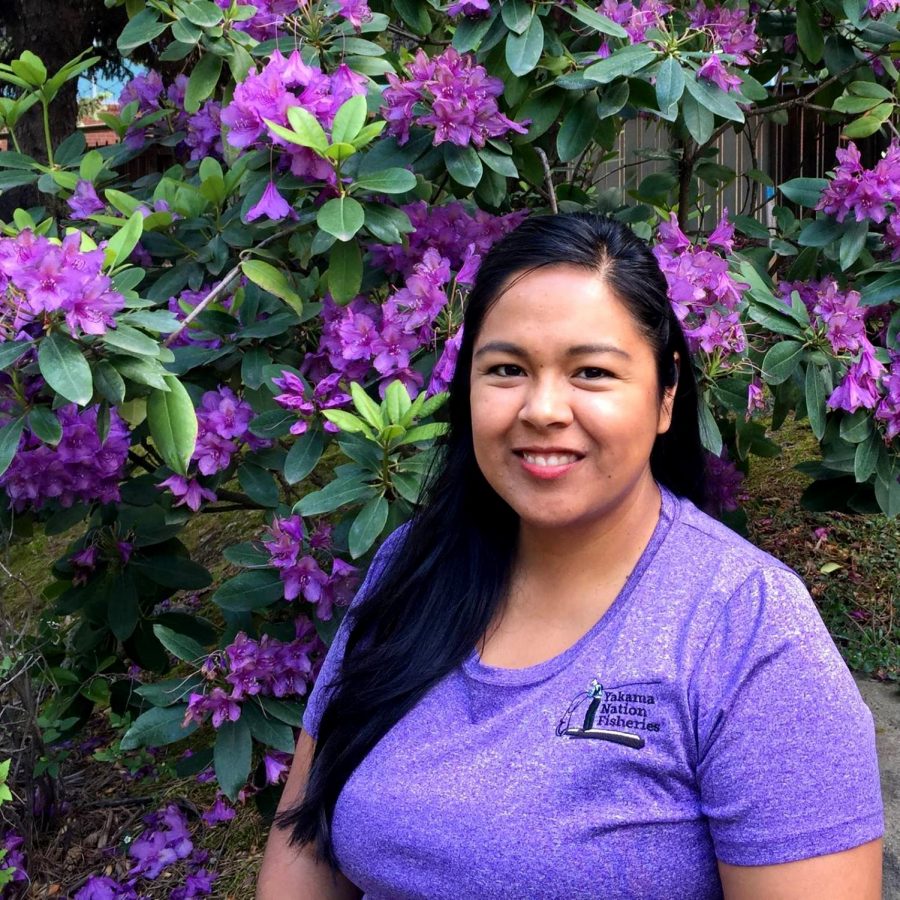New BoT member brings a Yakima native perspective to the table
Emily Washines, CWU alumna, is a member of the Yakima nation. She was formally accepted as a CWU Board of Trustees member on Oct. 24. Courtesy of Washines’ Facebook.
November 30, 2017
The first thing that CWU Board of Trustees (BoT) Member Emily Washines does every morning is log into the social media accounts for the Yakama Nation Fisheries in order to interact with their tens of thousands of followers. She then helps her three children get ready for school. And, if she has time during lunch or later in the day, she might get to writing the novel she’s been working on since the beginning of November.
“It’s a really good creative outlet. I think in life, people should try to have stretch goals, no matter what that is. Where you have a really big goal and a very specific time frame in mind to get it done, and you just stretch for it. I think that can really push and help motivate you towards the direction you want to go,” Washines said, detailing the 1,600 words that she devotes each day to the novel.
Washines is the BoT’s newest member, having accepted her position from Gov. Jay Inslee late last October. She is currently the only member on the BoT that is also a member of the Yakama Nation. Washines graduated from CWU in 2006 with a degree in public policy and political science. At CWU, Washines had intentions of majoring in health policy, but was deterred away from that major with guidance from CWU Adjunct Professor Rex Wirth, with whom she would later go on to collaborate with on a chapter in 2003 on indigenous water rights.
“I just think that because of the size of Central, you can develop and have those kind of learning opportunities as well as potential publishing opportunities,” Washines said.
The Yakama Nation Fisheries is where Washines currently spends a majority of her time working in public relations. Before she established roles with the CWU of Culture and Environment and accepted her role with the BoT, Washines had developed a great connection and curiosity for the activities and people surrounding both the native and local community.
Raised in Toppenish, Wash. with her four other siblings, Washines learned early on about the importance of preserving native language, art and culture. Her mother and father made sure that Washines would learn a lot about the history and traditions of the Yakama nation. From an early age, Washines remembers attending pow wow dances and learning basket weaving from her aunt, a tradition that she still practices to this day. Washines distinctly remembers watching the tv show Felicity and making beads in between classes at Yakima Valley Community College.
She enrolled at Yakima Valley Community College (YVCC) directly after high school, and for a semester in between classes would go on to study the preservation and languages of native nations in Alaska.
When Washines returned to Washington to finish her transfer degree, she brought back a perspective that greatly affected the way she viewed her culture and role within the Yakama Nation.
“It’s about cultural identity. It’s about recognizing that an entire database of knowledge is contained within one native word. In order to protect the resources and improve them, we have to understand what that knowledge means and is,” Washines said. “If we’re not using the language that was historically used, we’re missing entire sets of information.”
Before transferring to CWU, Washines worked for Governor Gary Locke from February to June of 2002 as an education intern. She received 12 total credits through YVCC. During her time with Locke’s administration, she was able to work in many different programs within education. She would often find herself speaking to librarians all around the state and help to instill programs that helped to boost state-wide literacy rates, such as the Read Across America program.
When it comes to being a student and gaining experience within a selected field, Washines believes that those extra steps you take outside the classroom make all the difference.
“If there’s something that feels like a very long term process, I would recommend trying to almost go the other way and see ‘what can I get involved with that could just be done maybe this month, or in this quarter,’” Washines said. “ That aspect of seeing something from start to finish really helps you grow.”
With the BoT, Washines hopes that she can contribute to the overarching plan that has been established within the board. Improving retention rates and keeping enrollment rates up are just some of the big picture items that Washines hopes that she can help improve.
“Emily brings tremendous expertise to higher education, especially with regards to student life. She was born and raised in Central Washington, where about a thousand of our students and (all) of our staff live. She’s worked on capital budgets in the past, so I’ve known her for a while… We’re really looking forward to having her on the board. She just fits right in,” Secretary to the BoT Linda Schactler said.



